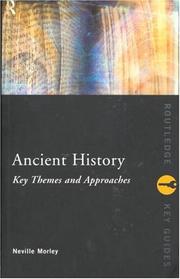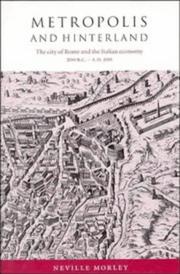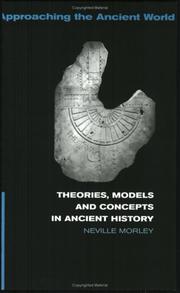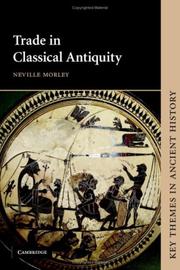| Listing 1 - 10 of 24 | << page >> |
Sort by
|

ISBN: 0415165091 0415165083 9780415165099 9780415165082 Year: 2000 Volume: *1 Publisher: London: Routledge,
Abstract | Keywords | Export | Availability | Bookmark
 Loading...
Loading...Choose an application
- Reference Manager
- EndNote
- RefWorks (Direct export to RefWorks)
Ancient history --- Geschiedenis [Oude ] --- Geschiedenis van de oudheid --- Histoire ancienne --- Histoire de l'antiquité --- History [Ancient ] --- Oude geschiedenis --- History, Ancient. --- History, Ancient --- Historiography. --- Historiographie --- Ancient world history --- World history --- Historiography --- History, Ancient - Historiography.
Book
ISBN: 0715628801 9780715628805 Year: 1999 Publisher: London: Duckworth,
Abstract | Keywords | Export | Availability | Bookmark
 Loading...
Loading...Choose an application
- Reference Manager
- EndNote
- RefWorks (Direct export to RefWorks)
History, Ancient --- Histoire ancienne --- Methodology. --- Historiography. --- Méthodologie --- Historiographie --- 930 --- History Ancient world --- Méthodologie

ISBN: 0521560063 0521893313 0511518587 9780521560061 9780511518584 9780521893312 Year: 1997 Publisher: Cambridge: Cambridge university press,
Abstract | Keywords | Export | Availability | Bookmark
 Loading...
Loading...Choose an application
- Reference Manager
- EndNote
- RefWorks (Direct export to RefWorks)
Ancient Rome was one of the greatest cities of the pre-industrial era. Like other such great cities, it has often been deemed parasitic, a drain on the resources of the society that supported it. Rome's huge population was maintained not by trade or manufacture but by the taxes and rents of the empire. It was the archetypal 'consumer city'. However, such a label does not do full justice to the impact of the city on its hinterland. This book examines the historiography of the consumer city model and reappraises the relationship between Rome and Italy. Drawing on archaeological work and comparative evidence, the author shows how the growth of the city can be seen as the major influence on the development of the Italian economy in this period as its demands for food and migrants promoted changes in agriculture, marketing systems and urbanisation throughout the peninsula.
Agriculture --- Urbanization --- Economic aspects --- Farming --- Husbandry --- Industrial arts --- Life sciences --- Food supply --- Land use, Rural --- Cities and towns, Movement to --- Urban development --- Urban systems --- Cities and towns --- Social history --- Sociology, Rural --- Sociology, Urban --- Urban policy --- Rural-urban migration --- Italy --- Rome --- Economic conditions. --- Social conditions. --- Economics --- Economic conditions --- Social conditions --- 510-30 B.C. --- Rome - Economic conditions - 510-530 B.C. --- Italy - Social conditions. --- Arts and Humanities --- History --- Agriculture - Economic aspects - Rome. --- Urbanization - Rome.

ISBN: 0415248760 0415248779 9780415248778 9780415248761 Year: 2007 Publisher: London: Routledge,
Abstract | Keywords | Export | Availability | Bookmark
 Loading...
Loading...Choose an application
- Reference Manager
- EndNote
- RefWorks (Direct export to RefWorks)
History, Ancient --- Historiography --- Philosophy --- Ancient history --- Ancient world history --- World history --- Historical criticism --- History --- Authorship --- Criticism --- Historiography. --- Philosophy. --- Histoire ancienne --- Historiographie --- Philosophie --- History, Ancient - Historiography --- History, Ancient - Philosophy

ISBN: 052163279X 0521634164 9780521632799 9780521634168 9780511618550 9780511296345 0511296347 051129557X 9780511295577 0511293984 9780511293986 0511556144 9780511556142 1107157706 1280959495 9786610959495 0511618557 0511294786 Year: 2007 Publisher: Cambridge Cambridge University press
Abstract | Keywords | Export | Availability | Bookmark
 Loading...
Loading...Choose an application
- Reference Manager
- EndNote
- RefWorks (Direct export to RefWorks)
Historians have long argued about the place of trade in classical antiquity: was it the life-blood of a complex, Mediterranean-wide economic system, or a thin veneer on the surface of an underdeveloped agrarian society? Trade underpinned the growth of Athenian and Roman power, helping to supply armies and cities. It furnished the goods that ancient elites needed to maintain their dominance - and yet, those same elites generally regarded trade and traders as a threat to social order. Trade, like the patterns of consumption that determined its development, was implicated in wider debates about politics, morality and the state of society, just as the expansion of trade in the modern world is presented both as the answer to global poverty and as an instrument of exploitation and cultural imperialism. This 2007 book explores the nature and importance of ancient trade, considering its ecological and cultural significance as well as its economic aspects.
Commerce --- History --- Histoire --- Mediterranean Region --- Méditerranée, Région de la --- Méditerranée, Region de la --- History. --- Social life and customs. --- Moeurs et coutumes --- Circum-Mediterranean countries --- Mediterranean Area --- Mediterranean countries --- Mediterranean Sea Region --- Arts and Humanities

ISBN: 0203198271 1134709846 1280182474 9780203198278 0415165091 9780415165099 0415165083 9780415165082 0203198301 9780203198308 9786610182473 6610182477 9781134709793 9781134709830 9781134709847 1134709838 9781280182471 Year: 2000 Publisher: London New York Routledge
Abstract | Keywords | Export | Availability | Bookmark
 Loading...
Loading...Choose an application
- Reference Manager
- EndNote
- RefWorks (Direct export to RefWorks)
Ancient History: Key Themes and Approaches is a sourcebook of writings on ancient history. It presents over 500 of the most important stimulating and provocative arguments by modern writers on the subject, and as such constitutes an invaluable reference resource. The first section deals with different aspects of life in the ancient world, such as democracy, imperialism, slavery and sexuality, while the second section covers the ideas of key ancient historians and other writers on classical antiquity. Overall this book offers an invaluable introduction to the most important ideas, the
History, Ancient. --- History, Ancient --- Ancient history --- Ancient world history --- World history --- Historiography.

ISBN: 1134536100 1280167912 0203502248 9780203502242 9780415248761 0415248760 9780415248778 0415248779 0415248760 0415248779 9781134536108 9781280167911 9781134536054 9781134536092 1134536097 Year: 2004 Publisher: London New York Routledge
Abstract | Keywords | Export | Availability | Bookmark
 Loading...
Loading...Choose an application
- Reference Manager
- EndNote
- RefWorks (Direct export to RefWorks)
Morley's book offers the first accessible guide for students to show how theories, models and concepts have been applied to ancient history.Showing readers how they can use theory to interpret historical evidence for themselves, as well as to evaluate the work of others, the book includes a survey of key ideas and theories on a wide range of ancient historical topics including society and economy, the environment, gender and sexuality, and myth and rationality. Also including a helpful annotated guide to further reading on all the topics covered, students will not want to miss
History, Ancient --- Historiography. --- Historical criticism --- History --- Authorship --- Ancient history --- Ancient world history --- World history --- Philosophy. --- Criticism --- Historiography
Book
ISBN: 9781783715732 9781849645478 1849645477 9780745328706 9780745328690 0745328695 0745328709 1783715731 Year: 2010 Publisher: Mosman : iMinds Pty Limited,
Abstract | Keywords | Export | Availability | Bookmark
 Loading...
Loading...Choose an application
- Reference Manager
- EndNote
- RefWorks (Direct export to RefWorks)
The idea of Rome has long outlived the physical empire that gave it form. It continues to shape our understanding of the nature of imperialism, and thus, however subtly, to influence the workings of the world. Unlike most works on Roman history, this book does not offer a simplistic narrative, with military triumph followed by decline and fall. Instead, it analyses the origins and nature of Roman imperialism, its economic, social and cultural impact on the regions it conquered, and its continuing influence in debates about modern imperialism --Book Jacket. A millenium and a half after the end of its dominance, Rome remains a significant presence in western culture. This book explores what the empire meant to its subjects. 'A clever re-assessment of Roman imperial achievement. Morley provacatively challenges conventional views on the dynamics of empire. This book should be read by those interested in ancient history and by those who watch for the rise and fall of superstates in the twenty-first century.'--Christopher Kelly, Senior Lecturer in Classics, Cambridge University. 'Morley's book is not just an acute analysis of the development of one of the most influential of all the world's historical empires, but also a reflection on the power and pitfalls of self-justification through appeal to an imagined past. Discussions of the dynamics of Roman imperialism ... are complemented by thoughtful accounts of the economic impact of empire.'--Professor Paul A. Cartledge, A.G. Leventis Professor of Greek Culture Cambridge University. 'How do empires grow, how are they ruled, do they exploit their subjects or civilise them? Morley's book weaves together modern theories of imperialism with the story of Europe's first, and greatest, empire.'--Gregory Woolf, Professor of Ancient History, St. Andrews University.
Imperialism. --- Rome --- Civilization. --- History. --- Colonialism --- Empires --- Expansion (United States politics) --- Neocolonialism --- Political science --- Anti-imperialist movements --- Caesarism --- Chauvinism and jingoism --- Militarism
Book
ISBN: 9781405131391 9781405131407 Year: 2009 Publisher: Chichester, U.K. ; Malden, MA : Wiley-Blackwell,
Abstract | Keywords | Export | Availability | Bookmark
 Loading...
Loading...Choose an application
- Reference Manager
- EndNote
- RefWorks (Direct export to RefWorks)
History, Ancient --- Social evolution. --- Social sciences --- Philosophy.
Book
ISBN: 9783938032565 Year: 2013 Publisher: Heidelberg : Verlag Antike,
Abstract | Keywords | Export | Availability | Bookmark
 Loading...
Loading...Choose an application
- Reference Manager
- EndNote
- RefWorks (Direct export to RefWorks)
History, Ancient --- Histoire ancienne --- Historiography --- Historiographie
| Listing 1 - 10 of 24 | << page >> |
Sort by
|

 Search
Search Feedback
Feedback About UniCat
About UniCat  Help
Help News
News